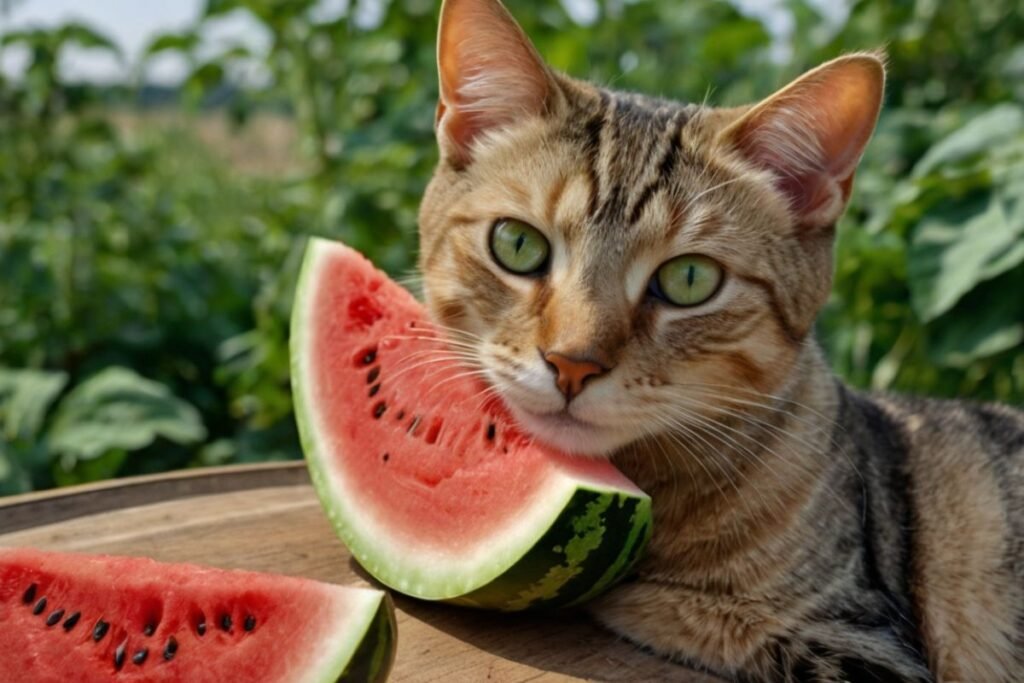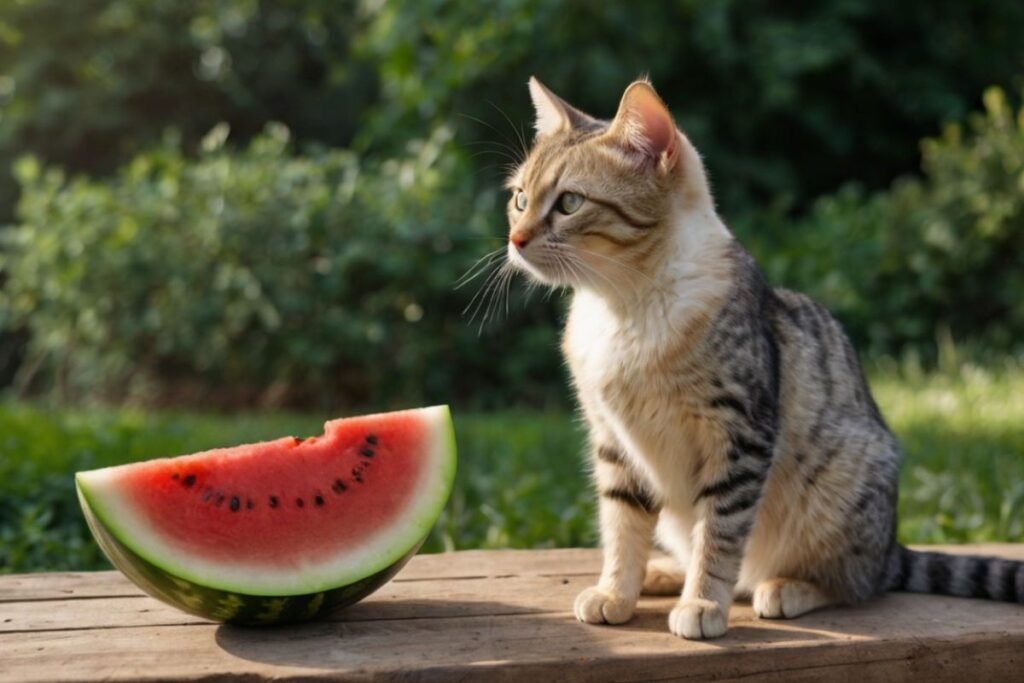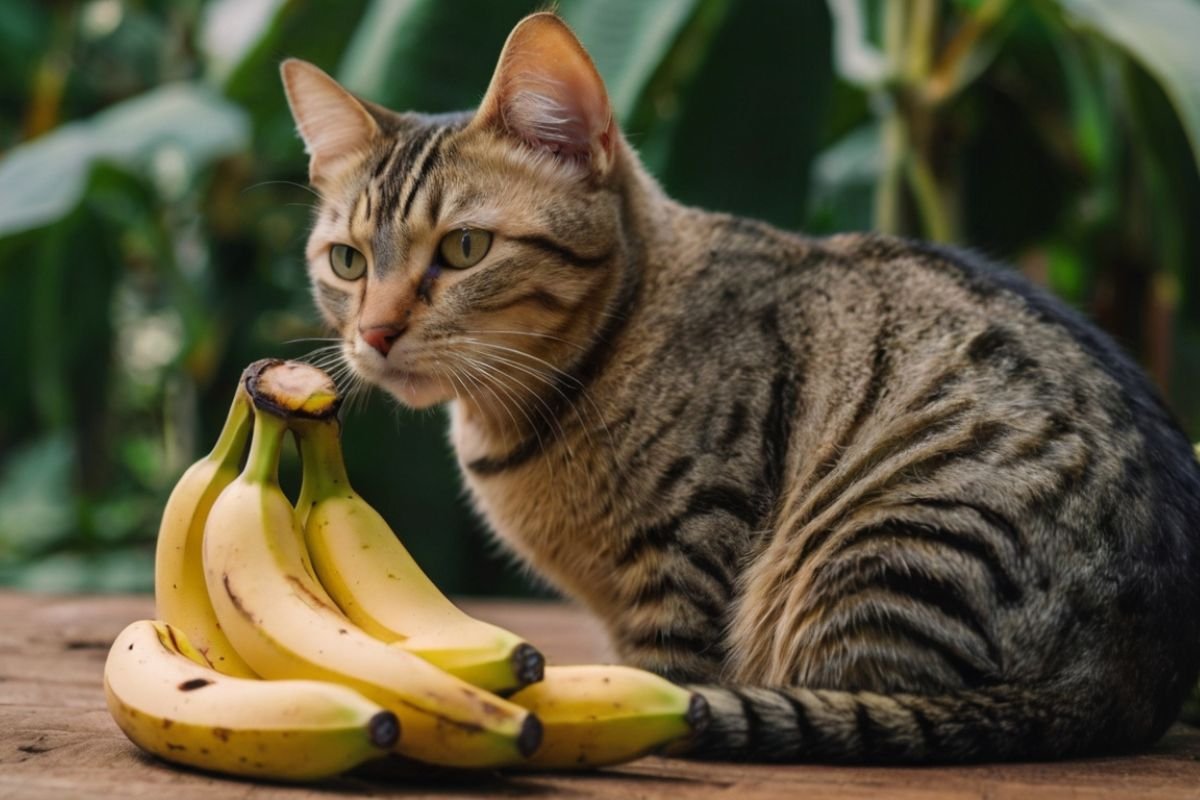Rio (my cat) loves to watch me eat watermelon on hot summer days, his curious eyes following every juicy bite. But should I share this sweet treat with my feline friend? Let’s dive into everything you need to know about cats and watermelon.

Table of Contents
Is Watermelon Safe for Cats?
Yes, cats can eat watermelon in small amounts. This juicy summer fruit is not toxic to our feline friends. In fact, it can be a fun, hydrating treat on hot days.
But hold on. Before you rush to share your watermelon slice, there are some things you need to know.
Cats are obligate carnivores. This means they need meat to live well. Their bodies are made to get most nutrients from animal sources. Plant foods like fruits don’t fit their natural diet.
My cat Rio once spotted me eating watermelon and looked very interested. His orange fur seemed to glow as he sat there, tail swishing, eyes fixed on my plate. I decided to look into whether sharing would be safe.
What I found is that while cats can have watermelon, it should only be an occasional treat. Not a regular food item.
Also read: Can Cats Eat Cheese?
The Good: Benefits of Watermelon for Cats
Watermelon has some good points as a cat treat. Let’s look at these first.
Hydration Help
Watermelon is 92% water. That’s a lot! This high water content can help cats stay hydrated. This is extra helpful for cats who don’t drink enough water.
Many cats don’t drink as much as they should. Some cats like Rio prefer running water or very fresh bowl water. A bit of watermelon can add some extra fluid to their day.
Low in Calories
If your cat needs to watch their weight, watermelon is a low-calorie treat option. It won’t add many extra calories to their diet when given in small amounts.
One cup of diced watermelon has only about 46 calories. Compare that to many store-bought cat treats, which can be quite high in calories.
Some Useful Nutrients
Watermelon contains these nutrients:
- Vitamin A (good for vision and immune health)
- Vitamin C (an antioxidant)
- Potassium (helps heart and kidney function)
- Lycopene (a helpful plant compound)
While cats get most nutrients from meat, these extras won’t hurt.
A Cool Summer Treat
On hot days, a small piece of cold watermelon can help cool your cat down. Rio likes to lick small watermelon bits when our house gets warm in summer.
Think of it as a cat popsicle. A fun way to help them chill out when it’s hot.
The Bad: Risks and Concerns
Now let’s look at some reasons to be careful with watermelon.
Sugar Content
Watermelon contains natural sugars. While not as high as some fruits, it still has more sugar than a cat’s diet should include.
Cats can’t taste sweet things like we can. Their taste buds don’t have sweet receptors. So they don’t crave sugar. Their bodies also aren’t made to process lots of sugar.
Too much sugar can lead to:
- Weight gain
- Dental issues
- Upset stomach
- Diabetes risk (in the long term)
Digestive Issues
Cats have short digestive tracts made for meat. Plant matter can be hard for them to digest.
Too much watermelon might cause:
- Diarrhea
- Gas
- Stomach pain
- Vomiting
Start with tiny amounts if you want to try giving watermelon to your cat.
Seeds and Rind Dangers
The pink flesh of watermelon is the only safe part for cats. The seeds and rind can cause problems.
Watermelon seeds pose a choking risk. They can also block your cat’s digestive tract if eaten.
The rind is too tough for cats to digest well. It can cause tummy troubles or even blockages.
Always remove all seeds and rind before giving watermelon to your cat.
Not Nutritionally Necessary
Cats don’t need fruit in their diet. A high-quality cat food will meet all their nutritional needs.
Watermelon should be viewed as an occasional treat only. Not a health food for cats.
How to Safely Share Watermelon With Your Cat
If you want to let your cat try watermelon, here’s how to do it safely:
- Choose a ripe, fresh watermelon
- Wash the outside well before cutting
- Remove ALL seeds (even small white ones)
- Cut away ALL rind (the green outer part and white inner part)
- Cut the pink flesh into tiny, bite-sized pieces
- Offer just a small amount (about the size of a pea to start)
- Watch for any bad reactions
- Keep it rare – not an everyday treat
Signs Your Cat Might Not Tolerate Watermelon Well
After giving your cat watermelon, watch for these signs:
- Vomiting
- Diarrhea
- Loss of appetite
- Lethargy (being very tired)
- Stomach pain (might show as hunching or crying)
If you see these signs, stop giving watermelon and talk to your vet if the problems don’t go away quickly.
Cat Nutrition Basics: Why Cats Need Meat, Not Fruit
To fully get why watermelon is just an occasional treat, it helps to know some cat nutrition basics.
Cats are true carnivores. This is different from dogs, who are more omnivorous. Cats’ bodies need nutrients found only in animal tissues.
Key cat nutrition facts:
- Cats need taurine, an amino acid found only in animal products
- They need vitamin A in its active form (from animal sources)
- Their digestive systems are shorter than omnivores’
- They lack certain enzymes to process plant matter well
- They need higher protein levels than many animals
This is why your cat’s main diet should be high-quality cat food with animal proteins. Treats like watermelon should make up less than 10% of their daily food intake.
What Other Fruits Can Cats Eat?
If your cat likes watermelon, you might wonder about other fruits. Here’s a quick guide:
Generally safe fruits (in small amounts):
- Blueberries
- Strawberries
- Apple (no seeds)
- Banana
- Cantaloupe
- Peaches (no pit)
Fruits to avoid:
- Grapes and raisins (toxic to cats)
- Citrus fruits (can cause upset stomachs)
- Cherry (pits contain cyanide)
- Persimmons (seeds can cause problems)
Always remove seeds, pits, rinds, and peels before offering any fruit to your cat.
Why Do Some Cats Like Watermelon?
You might wonder why some cats show interest in watermelon at all. If cats can’t taste sweet, what’s the appeal?
Several factors might explain this:
- Texture – The meaty, moist texture might feel nice to chew or lick
- Temperature – Cold watermelon feels good on hot days
- Water content – The high moisture content may attract cats
- Curiosity – Cats often want to try what their humans are eating
- Protein compounds – Watermelon does contain some amino acids
Rio seems most interested in watermelon when it’s cold from the fridge. He likes to lick it more than chew it.
Every cat is different. Some might love watermelon while others turn their nose up at it.
Creating a Balanced Diet for Your Cat
While treats like watermelon can be fun, the core of cat health is a balanced diet. Here’s what that looks like:
- High-quality commercial cat food (wet, dry, or both)
- Proper portions based on age, weight, and activity level
- Fresh water always available
- Limited treats (less than 10% of daily calories)
- Any diet changes made slowly
Talk to your vet about the best diet for your specific cat. Factors like age, health issues, and weight matter a lot.
If your cat has diabetes, kidney disease, or food allergies, ask your vet before giving any treats, including watermelon.
Fun Watermelon Treat Ideas for Cats
If your vet says watermelon is OK for your cat, here are some fun ways to serve it:
Frozen Watermelon Bits
- Cut seedless watermelon flesh into pea-sized cubes
- Freeze them on a tray
- Offer one as a cooling treat on hot days
Watermelon Ice Cubes
- Puree seedless watermelon flesh
- Pour into an ice cube tray
- Freeze
- Add one cube to your cat’s water bowl on hot days
Watermelon and Chicken Treats
- Mix tiny bits of watermelon with small pieces of cooked chicken
- Serve as a special treat (the meat makes it more appealing)
Remember to keep portions tiny. These are special treats, not meals.
Real Cat Parents’ Experiences With Watermelon
Many cat parents have tried sharing watermelon with their pets. Here are some common experiences:
“My cat Mittens goes crazy for watermelon! She can hear me cutting it from across the house and comes running.”
“My three cats all react differently. One loves it, one sniffs and walks away, and one acts offended I even offered.”
“My vet suggested frozen watermelon bits for my senior cat who needed more fluids. It helped get him through a hot summer.”
As for Rio, he likes to lick small pieces of watermelon but never eats much. He seems to enjoy the moisture more than anything else.
When to Talk to Your Vet About Your Cat’s Diet
While a bit of watermelon now and then is usually fine, some situations call for a vet consult first:
- If your cat has diabetes
- If your cat has kidney disease
- If your cat has a history of bladder stones
- If your cat has food allergies or IBD
- If your cat is on a special prescribed diet
- If your cat is very young or very old
Your vet knows your cat’s health history and can give the best advice.
The Bottom Line: Watermelon as an Occasional Cat Treat

So, can cats eat watermelon? Yes, but with these key points in mind:
- Watermelon is non-toxic to cats
- Only the seedless flesh is safe
- It should be an occasional treat only
- Start with tiny amounts
- Watch for digestive upset
- Never force it if your cat isn’t interested
Your cat’s main diet should still be quality cat food. Think of watermelon as a small bonus, not a regular menu item.
Creating a Safe Treat Environment
When offering watermelon or any treat, keep these tips in mind:
- Offer treats when your cat is calm, not as a way to stop bad behavior
- Don’t give treats from your plate during meals (this can lead to begging)
- Have a specific treat time or use treats during play or training
- Never force your cat to try something new
- Always supervise your cat with any new food
Beyond Watermelon: Meeting Your Cat’s True Needs
While it’s fun to share safe treats with your cat, remember that what cats really need goes beyond food:
- Regular play time
- Mental stimulation
- Clean litter boxes
- Fresh water
- Cozy rest spots
- Vertical space (cat trees, shelves)
- Routine vet care
- And most importantly, your love and attention
A small taste of watermelon might make your cat happy for a moment. But these other needs are what truly keep them healthy and content.
Final Thoughts
Cats and watermelon can mix in small doses. This summer fruit isn’t toxic and can be a fun treat now and then. Just remember the golden rules: remove seeds and rind, keep portions tiny, and don’t make it a daily habit.
Rio’s curious interest in my watermelon snacks led me down a path of learning more about cat nutrition. While he gets his little taste sometimes, I make sure his main diet meets his carnivore needs.
Every cat is unique. Your cat might love watermelon or want nothing to do with it. Either way is perfectly normal. The most important thing is keeping your feline friend healthy and happy with a diet that meets their true biological needs.
So next time you’re enjoying a juicy slice of watermelon and feel those hopeful cat eyes watching you, you can safely share a tiny seedless piece. Just don’t be surprised if your cat sniffs it and walks away – or if they come back begging for more!

Shahriar Robin is the creator of WhatPetsCanEat.com, a passionate pet lover and dedicated cat dad to Rio, a curious two-year-old orange feline who inspired this website. With a love for animals and a knack for research, Shahriar shares trusted, easy-to-understand information to help fellow pet owners make safe, healthy food choices for their furry friends.


